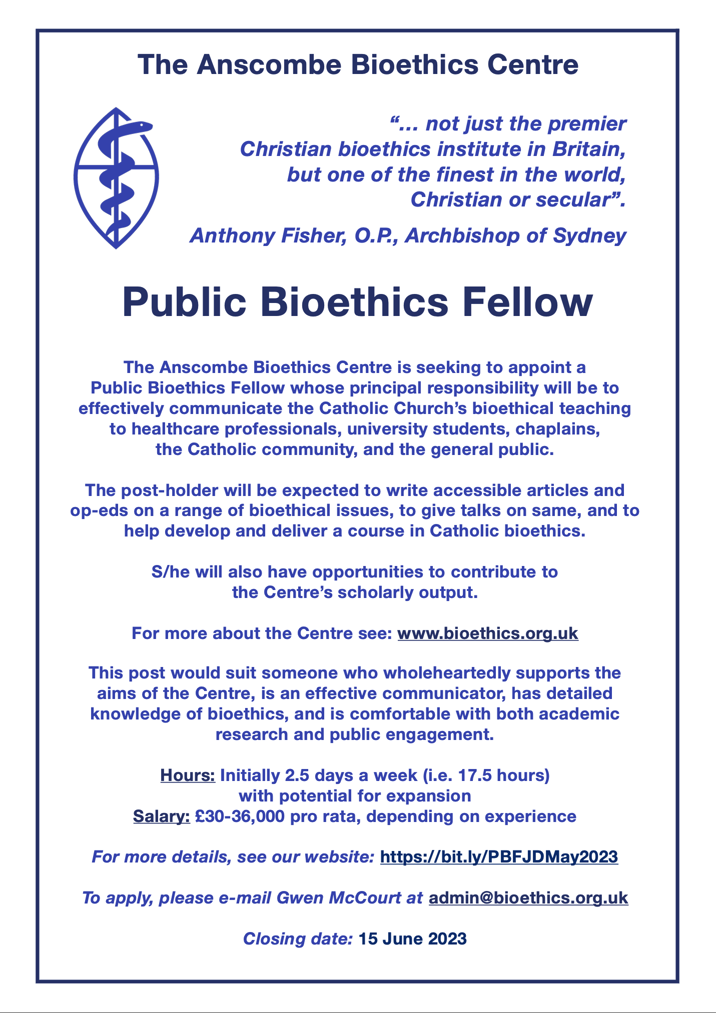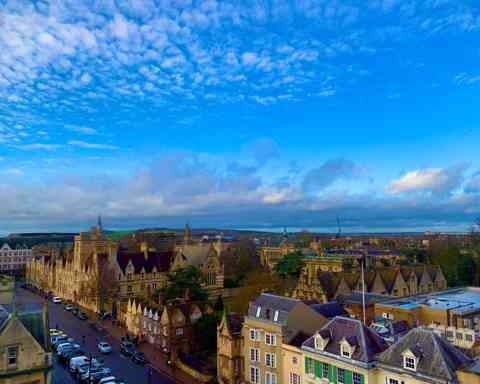New Anscombe Job Advertisement – Public Bioethics Fellow
Read in PDF
JOB DESCRIPTION
The principal responsibility of the Public Bioethics Fellow is to facilitate the effective communication of the Catholic Church’s moral teaching as it bears on bioethics to:
- Healthcare professionals and biomedical scientists;
- Medical, nursing and other university students;
- The Catholic and wider Christian community;
- The general public.
This will be done by:
- Writing popular articles and opinion pieces in an accessible style without compromising the essential technical and ethical content to be communicated;
- Lecturing (semi-regular), giving talks and presentations, and participating in conferences and seminars, both in-person and on-line;
- Contributing to the Centre’s output of peer-reviewed scholarship;
- Helping to develop and deliver a course in Catholic bioethics;
- Devising and initiating public bioethics projects of his or her own to communicate the Centre’s message more effectively;
- Networking conducive to public bioethics outreach;
- Editing the website and related social media as a public resource for Catholic bioethics;
- Working closely with the Director on projects and tasks initiated by the Director;
- Performing such other reasonable tasks as may be requested from time to time as part of the overall work of the Centre.
As Public Bioethics Fellow, you will work in a small and dynamic team as part of one of the world’s longest established and best bioethics centres.
PERSON SPECIFICATION
Essential
Education:
- MA/MSc degree or equivalent in a relevant discipline (e.g. philosophy, theology, law, medicine, biomedical sciences),
Skills/Aptitudes:
- A strong researcher with high-level analytical skills;
- Clear and persuasive communicator (in both written and oral formats);
- Works well with others;
- Strong work ethic;
- Ability to use, or to learn how to use, electronic media (including updating web-content);
- Can creatively pursue new ways of communicating Catholic bioethics.
Knowledge/Experience:
- Experience in public speaking (e.g., teaching, presentations, debating);
- An academic interest in bioethics;
- A solid grasp of the fundamentals of Catholic moral teaching.
Personal attributes:
- While the post-holder does not necessarily have to be a Catholic, s/he must fully support the aims and the Catholic ethos of the Centre, and commit not to behave in a manner which can reasonably be judged prejudicial to the Centre’s mission and public reputation;
- Conscientious.
Desirable
Education:
- Doctoral qualification in a relevant discipline.
Skills/Aptitudes:
- Very good IT skills.
Knowledge/Experience:
- Experience in academic lecturing/teaching;
- Persuasive debater in both written and oral formats.
Achievements:
- Popular publications of a scholarly/academic nature;
- Peer-reviewed publications.
PAY AND CONDITIONS
The successful applicant will be appointed for a period of 2 years in the first instance, with a probationary period of 6 months.
The starting salary of the Public Bioethics Fellow will be £30-36,000 pro rata, depending on experience. The Centre will also contribute 8% of salary into a personal pension scheme.
This job is part-time, for the equivalent of 2.5 days a week (17.5 hours) with potential for expansion of the role. There is some flexibility about when hours are taken, but the post-holder must be prepared, from time to time, to respond to news queries, social media activity, etc. at short notice. In general, the post-holder will work remotely (“from home”) but some work will require the post-holder to be onsite for Centre meetings, events or for public speaking (e.g., lecturing). Occasional weekend working may be required.
APPLICATIONS
Applicants should submit a CV and a cover letter which makes clear their suitability for the post of Public Bioethics Fellow, together with an opinion piece (op-ed) pitched for a national newspaper on a bioethical topic of choice (750 to 800 words) plus one other piece of written work (3,000 to 7,000 words) which could be but need not be related to bioethics. The applicant’s written work should not contain any identifying information so it can be assessed independently from the rest of his or her application.
Applicants should also provide contact details for two referees, at least one of whom should be well-placed to testify to the candidate’s respect for the mission and Catholic ethos of the Centre. References should be sent directly to the Centre by referees. Applicants should give their referees notice of the deadline for references.
Further details:
- CVs (together with cover letters, contact details for references and written work) should be sent directly and independently to Gwen McCourt at admin@bioethics.org.uk, to whom further enquiries may also be directed;
- Closing date for applications: 12 noon, Thursday 15 June 2023;
- Deadline for references: 12 noon, Monday 19 June 2023;
- Interviews: Thursday 22 June 2023, via Zoom;
- Proposed commencement of the position: By mutual agreement and not later than Monday 25 September 2023.
Please note that applicants must have the right to work in the UK and may be asked to furnish documentary proof if offered the position.
Most recent
Press Release – Anscombe Bioethics Centre Launches ‘Advance Decisions and Ethical Choices’ Project
31 July 2025
The Anscombe Bioethics Centre is pleased to launch a new suite of resources on advance statements, l...
Statement on the Anscombe Bioethics Centre
31 July 2025
A statement from the Governing Body of the Anscombe Bioethics Centre and the Trustees of the Catholi...
Copyright Announcement
25 July 2025
Henceforth, all work which had Anscombe Centre or Linacre Centre copyright is now dedicated to the p...
Sincerest Thanks for Your Support
Staff are grateful to all those who sustained the Centre in the past by their prayers and the generous financial support from trusts, organisations, communities and especially from individual donors, including the core funding that came through the Day for Life fund and so from the generosity of many thousands of parishioners. We would finally like to acknowledge the support the Centre has received from the Catholic community in Ireland, especially during the pandemic when second collections were not possible.
We would like to emphasise that, though the Centre is now closed, these donations have not been wasted but have helped educate and support generations of conscientious healthcare professionals, clerics, and lay people over almost 50 years. This support has also helped prevent repeated attempts to legalise euthanasia or assisted suicide in Britain and Ireland from 1993 till the end of the Centre’s work on 31 July 2025.



